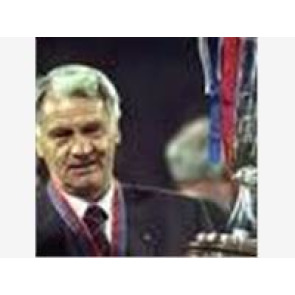BOBBY ROBSONFew figures in football, let alone those who have managed the English national team, enjoyed the widespread popularity and respect of Sir Bobby Robson, who died from cancer on 31 July 2009, aged 76.As a player he was a stalwart of both Fulham and West Brom, playing more than 250 games for both clubs. He also won 20 caps for England.Despite being an astute and skilful inside-left, and one of the most sought-after players of his generation, he remained loyal to two clubs of modest potential and thus never won a trophy as a player.He made up for it as a manager, winning the FA and UEFA Cups as he returned Ipswich to glory - and later winning further trophies with European clubs. And of all England managers since 1966, he came the closest to winning the World Cup.Five times he fought cancer, and after his last diagnosis he devoted his time to raising money for the Sir Bobby Robson Foundation, which raised more than £1.2m and kitted out a state-of-the art centre in his beloved Newcastle to fight the disease.After his latest diagnosis he finally admitted cancer was going to beat him, saying: "I have accepted what they have told me and I am determined to make the most of what time I have left. I am going to die sooner rather than later. But then everyone has to go some time, and I have enjoyed every minute."Robert William Robson was born on 18 February, 1933, in County Durham. He was the son of a coal miner who "bled Black and White" and was suitably stunned when his son was snatched from under Newcastle United's nose by London club Fulham in 1950.At first it seemed like a bad choice, with the Cottagers being relegated at the end of his second season. But as he would later prove in management, Robson's primary concern was the atmosphere of a club and he was content to stay until 1956, by which time he had scored 68 goals in 152 league games.He transferred for a club record fee of £25,000 to Vic Buckingham's West Bromwich Albion, a side that a few years earlier had been labelled the 'Team of the Century' for their fluid football. With The Baggies he came his closest to silverware with an FA Cup semi-final appearance and several top five finishes.Of his 61 goals, 24 came in the 1957/58 season, making him the club's top scorer that year. He played 257 matches and was made club captain for two years, but relations with Albion eventually soured over his salary demands. In 1962 he returned to the comfort of Fulham who doubled his salary after paying £20,000 for the 29-year-old.He played for Fulham, now back in the First Division, for another five years.With an eye on management, he reportedly turned down Arsenal and Southend, to begin the next phase of his career in Canada with Vancouver Royals as a player-manager. It was an unhappy year, but once again he was able to retreat to Fulham who offered him the position of manager in January 1968.It was a baptism of fire with Fulham floundering at the foot of the league; he couldn't avoid relegation and was sacked the following November.He took over the vacant position at Ipswich Town at the start of 1969 after meeting the club's director while scouting for Chelsea. His first few seasons with the First Division side were unspectacular, but winning the Texaco Cup in 1973 signalled a renaissance in the club's fortunes.The FA Cup followed in 1978 and then the UEFA Cup in 1981, while in the league Ipswich were consistently competitive and were twice championship runners-up. In 13 years there he signed only 14 players.Inevitably when Ron Greenwood was sacked after the 1982 World Cup, Ipswich faced a battle to keep their manager, a battle they lost despite offering a 10-year contract.Robson is now almost universally consider England's best coach since Alf Ramsey, but much of his reign was troubled.His team were knocked out of the Euro 84 qualifiers by Denmark and played poorly for most of the 1986 World Cup in Mexico, though ultimately it was Diego Maradona's 'Hand of God' goal that was to cost them progress from the quarter finals. "It wasn't the hand of God. It was the hand of a rascal," Robson commented, more magnanimously that one might have expected.England were undefeated qualifying for Euro 88 in West Germany, but left the tournament after only playing group stage matches, all of which they lost. Yet they qualified for Italia 90 without conceding a goal and famously crashed out at the semi-final stage in a dramatic shoot-out with eventual winners West Germany. Robson, whose England contract expired thereafter, blamed himself for tactical mistakes but fans heralded him for bringing the side to its closest to a trophy for 24 years.After leaving the England job, he managed with success in Europe, leading PSV Eindhoven to two Dutch Championships, taking Sporting to the top of the Portuguese league for the first time in 15 years (only be sacked by the club's erratic president), winning the Portuguese league and cup with Porto and finally winning the Spanish Cup, Spanish Super Cup and European Cup Winners' Cup in one season in charge of Barcelona.He had one more season at Eindhoven but it was his return to England and subsequent appointment as manager of Newcastle United that cemented his reputation as one of the greats of the English game. Between September 1999 and his contentious dismissal in August 2004 he elevated his hometown club from bottom of the Premier League to several seasons of Champions League football.After being sacked following a poor start to the 2004/05 season, Robson was not reticent about criticising Newcastle chairman Freddy Shepherd for his running of the club, claiming in his 2005 autobiography that his job had been made impossible because of Shepherd's neglect of the club's vital infrastructure, such as training facilities and youth development.His contribution to the game was recognised with a CBE and then a Knighthood. He was given the freedom of Newcastle in 2003 while in Ipswich they erected a life-size statue of him. Outside his management, he had also contributed to the game a television pundit and magazine columnist.
Keep me informed of updates








